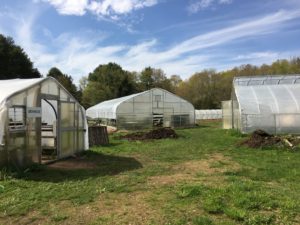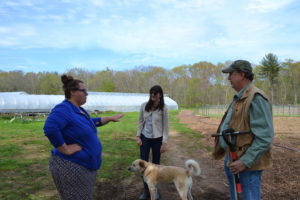This blog post was written by WLA Intern – Addee Kim
“We really want to feed our neighbors more than anyone else,” Baylee Rose Drown says, gazing out over her four-and-a-half-acre fruit and vegetable farm in Lyme, Connecticut. Baylee, who manages Upper Pond Farm with her husband Ryan Quinn, grew up on her family’s Holstein dairy farm in Michigan. Before moving to Connecticut, Baylee spent some time managing the farm at Green Mountain College, where she was also an adjunct professor and in 2013 she and her husband relocated to her husband’s hometown of Old Lyme. After finding a listing for a “farm manager position” on Good Food Jobs, she found he rself with the unique opportunity to rent farmland close to the shoreline. A former chemistry teacher, Ryan’s specializes in soil, while Baylee’s education in sustainable food systems informs her philosophy of regenerative farm management. Together, they make the perfect team.
rself with the unique opportunity to rent farmland close to the shoreline. A former chemistry teacher, Ryan’s specializes in soil, while Baylee’s education in sustainable food systems informs her philosophy of regenerative farm management. Together, they make the perfect team.
Every week the farm provides vegetables and fruits to their CSA members who each purchase a share of the crop at the beginning of the growing season. Heeding to the calls of their neighbors, Baylee started their CSA program in 2015 with the goal of 40 shares. Forty quickly became 60, and today the Upper Pond sells to 130 families. Although the majority of Upper Pond Farm’s produce is sold through the CSA, Baylee does supply some nearby restaurants, farmers markets, and grocery stores with their hearty produce as well as donates to the Shore Line Soup Kitchen.
Connecticut has some of the richest farmland in the United States and the agricultural industry has an impact of $4 billion on the state economy. But new and beginning farmers face significant barriers to entering into the market. One of the greatest challenges is limited access to affordable farmland. Baylee is quite familiar with this challenge; she came to Connecticut with a Subaru she borrowed from her family and little else. Facing mounting student debt, taking out additional loans through traditional lenders was not an option. She was lucky enough to receive an operating loan from an individual, and, in 2017, the Connecticut Farmland Trust accepted the donation of a conservation easement on New Mercies Farm.
Because Baylee had access to affordable land, she was able to invest in two high tunnels, two low tunnels, and a workforce that is treated with the dignity of a living wage. The farm not only benefits the community that enjoys its produce but its environs as well. Baylee scrutinizes every practice, minimizing the amount of energy and inputs needed to grow by intercropping and flame weeding, for example. The promotion of the natural environment– from the health of the soil to the ecological biodiversity and water quality that would otherwise be lost to development or depleting farming practices– is just one reason protecting farmland is crucial for our futures.
Working Lands Alliance is working tirelessly to ensure small-scale farmers like Baylee have access to farmland and has partnered with the Connecticut Department of Agriculture in convening a Farmland Access Working Group that is looking farmland access opportunities and farm succession for all farmers across the state. This important group is currently analyzing how state agencies, service providers, and farmers can work together to configure programs and policies that will address the high cost of farmland on the speculative market. The group is also formalizing an inventory of the programs that currently exist within the state to help beginning farmers like Baylee continue to be successful.




